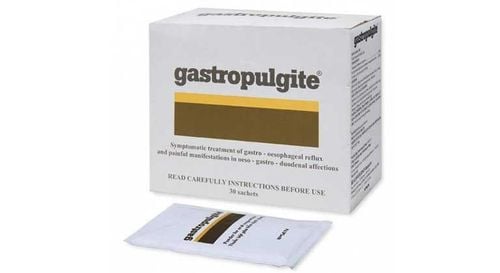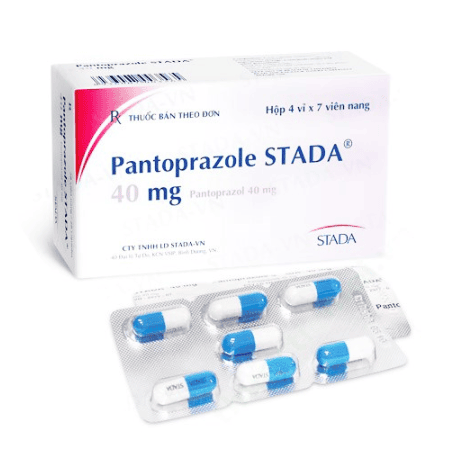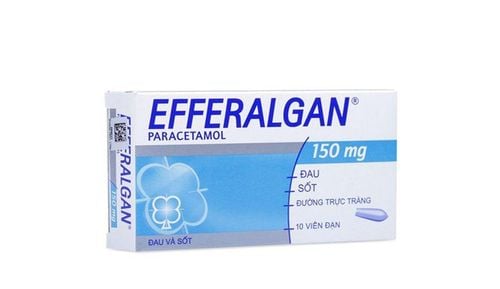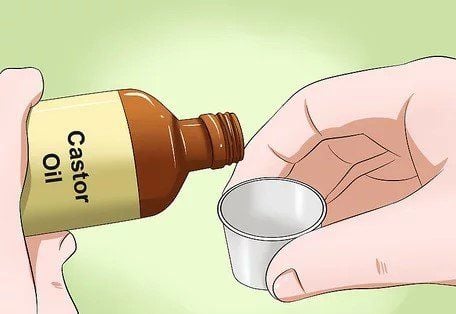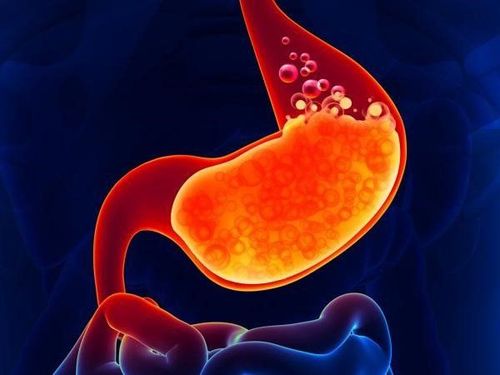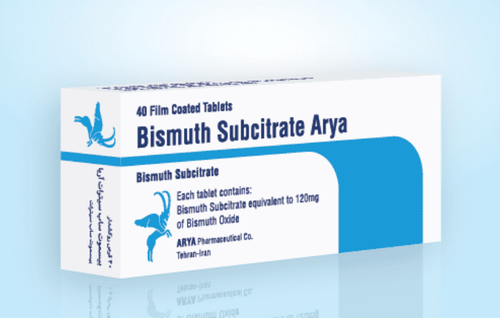This is an automatically translated article.
Glycate is used with other medicines to treat peptic ulcer disease. This medicine may help relieve stomach pain, however it has not been shown to be effective in healing ulcers. Glycate works by reducing the amount of acid in the stomach, slowing down the natural movements of the intestines.
1. What does Glycate do?
Glycate, also known as glycopyrrolate, is used in combination with other medicines to treat peptic ulcers. Glycate can help relieve stomach pain, however, it has not been shown to be effective in healing these ulcers, preventing them from returning, or preventing other problems caused by ulcers.
Glycate works by reducing the amount of acid in the stomach and slowing down the natural movements of the intestines and relaxing the muscles in the gastrointestinal tract. Glycopyrrolate belongs to a class of drugs called anticholinergics.
2. How to use Glycate
Glycate is taken by mouth, usually 2 to 3 times a day or as directed by your doctor. The dosage of Glycate is based on your medical condition and response to treatment. The manufacturer recommends that adults take no more than 8 milligrams of Glycate a day.
Use Glycate pills regularly to get the most benefit from it. Never increase the dose or abuse the drug for longer than prescribed. This not only makes the condition improve faster, but also increases the risk of unwanted effects.
3. Undesirable effects when using Glycate
Some unwanted effects that may occur when using Glycate include:
Drowsiness Dizziness Weakness Blurred vision Dry eyes Dry mouth Constipation Constipation Severe side effects such as: decreased sweating, hot dryness flushing of the skin, headless heartbeat, mental status changes (such as confusion, hallucinations, agitation, nervousness, unusual excitement), difficulty urinating, decreased sexual ability, vision changes (eg. For example, seeing a rainbow around lights at night) Before prescribing, doctors always weigh the benefits of Glycate more than the risk of side effects. However, in some cases, unwanted effects may still occur. Therefore, when you see unusual signs, especially when an allergic reaction occurs such as rash, itching or swelling of the face, tongue, throat, severe dizziness, difficulty breathing, ... In this case Patients should immediately notify the doctor for timely medical intervention.

Thuốc Glycate có thể gây một số tác dụng phụ cho người bệnh
4. Some notes when using Glycate
Some notes when using Glycate drugs include:
Inform your doctor about a history of allergy to glycate or any other allergies. Glycate may contain inactive ingredients that can cause allergic reactions or other serious problems. Report any medical history especially: personal or family history of glaucoma, prostate gland, urinary problems due to urinary obstruction, stomach/intestinal problems (eg. eg decreased bowel motility, obstruction, ulcerative colitis, infection, ileostomy, colostomy in patients with diarrhea), overactive thyroid, cardiovascular disease (eg, coronary artery disease) , angina , congestive heart failure, irregular fast heartbeats, heart problems caused by severe bleeding), high blood pressure, heartburn problems (eg, gastroesophageal reflux disease), hernia, problems with the esophagus), certain nervous system problems (autonomic neuropathy), myasthenia gravis, liver and kidney problems, etc. Glycate can make you sweat. sweat less, making you more susceptible to heat stroke. Avoid doing things that can cause you to overheat, such as working out or exercising in hot weather, or using a hot tub. When the weather is hot, it is necessary to drink a lot of water, dress lightly. If you get too hot, quickly find a place to cool down and rest. Get medical help right away if fever doesn't go away, mood swings, headache or dizziness,... Limit alcohol and alcoholic beverages or drugs during treatment with Glycate. Glycate can cause dry mouth, so to relieve dry mouth suck on sugar-free hard candy or chew (sugar-free) gum, drink water, or use a saliva substitute. Relieve dry eye by using artificial tears or eye lubricants as recommended by your doctor. To prevent constipation, eat plenty of fiber, drink enough water, and exercise regularly. You may also need to take a laxative if constipation occurs. You may experience blurred vision, dizziness, or drowsiness from your blood sugar being too high or too low. Therefore, do not drive, use machinery, or perform any activity that requires alertness or clear vision until you are certain that they can be performed safely. Older adults may be more sensitive to the side effects of Glycate, especially drowsiness, confusion, unusual excitement, constipation, and problems urinating. So consider using Glycate for the elderly. For pregnant women, Glycate should only be used when absolutely necessary. Talk to your doctor about the risks and benefits of Glycate. Tests such as blood cell counts, stool blood tests, X-rays or gastrointestinal exams, etc. should be performed periodically to monitor your progress or check for adverse effects. desire.

Người bệnh nên hói ý kiến bác sĩ trước khi dùng thuốc Glycate
5. Glycate drug interactions
Drug interactions can reduce the effect of Glycate, or increase the effect of unwanted effects. Tell the doctor about all other medications the patient takes, including prescription, over-the-counter and herbal products. Do not start, stop, or change the dose of any medicine without your doctor's consent.
Some products that may interact with Glycate drugs include:
Inflammation compresses, potassium capsules Drugs that are affected by slow bowel movements such as pramlintide azole antifungals: ketoconazole, itraconazole. Take it at least 2 hours before taking Glycate. Slow-soluble forms of digoxin Many other drugs that also cause dry mouth and constipation may interact with Glycate such as: certain other anticholinergic drugs (such as atropine, scopolamine), antispasmodics (such as clidinium, dicyclomine, propantheline). ), belladonna alkaloids. Some drugs to treat Parkinson's : trihexyphenidyl Some drugs used to treat irregular heartbeats: disopyramide, quinidine,... MAO inhibitors: isocarboxazid, linezolid, methylene blue, moclobemide, phenelzine, procarbazine, rasagiline , safinamide, selegiline, tranylcypromine,... Phenothiazine: chlopromazine Tricyclic antidepressants : amitriptyline Alcohol Antihistamines : cetirizine, diphenhydramine Sleep or anxiety relievers: alprazolam, diazepam, zolpidem Muscle relaxants and opioid analgesics : codeine Allergy or cough, cold or diet products may worsen drowsiness or heart palpitations Glycate may interfere with certain tests and falsify results such as laboratory tests. gastric secretion. So make sure that the lab technician and doctor know you are using Glycate.
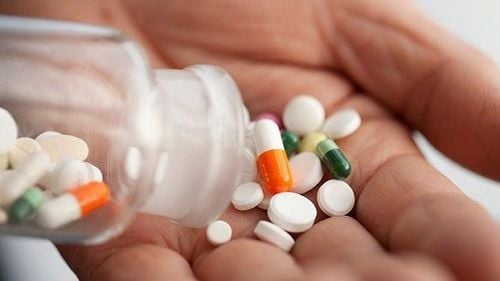
Thuốc Glycate có thể tương tác với một số loại thuốc khi kết hợp sai cách
6. How to store Glycate
Store Glycate at a temperature of 20-25 degrees Celsius (68-77 degrees Fahrenheit), away from moisture and light. Glycates are allowed for short-term storage of 15-30 degrees Celsius (59-86 degrees Fahrenheit). Do not store Glycate in a humid place or in the freezer. Each medicine will have different storage methods, so read the Glycate storage instructions carefully on the package, or ask your pharmacist. Keep Glycate out of the reach of children and family pets. When medicine is past its expiration date or cannot be used, dispose of it properly. Do not arbitrarily dispose of Glycate into the environment such as plumbing or toilet unless requested. Ask your waste disposal company or pharmacist for advice on how to safely dispose of Glycate to help protect the environment.
In summary, Glycate is used with other medications to treat peptic ulcer disease. This medicine may help relieve stomach pain, however it has not been shown to be effective in healing ulcers. Glycate works by reducing the amount of acid in the stomach, slowing down the natural movements of the intestines. However, Glycate can cause some unwanted effects and drug interactions, so tell your doctor what medicinal products you are using to reduce the risk of side effects and increase the effectiveness of treatment. .
Please dial HOTLINE for more information or register for an appointment HERE. Download MyVinmec app to make appointments faster and to manage your bookings easily.
Reference source: webmd.com



